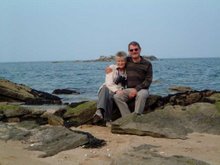Here we are, gliding through the Buttonwood canal
constructed in 1922 to provide access into the central lakes of the Everglades
from the sea. The opening of the canal promptly wrecked the delicate ecosystem,
by allowing salt water into the freshwater environment. Although the damaging
effects were apparent after a few years, it took until 1984 for a small dam to
be completed to seal the end of the canal from the sea.
We look out for exotic and dangerous creatures in the
mangrove jungle, being safe on the boat. The first item the guide points out is a
manchineel tree. It’s very ordinary looking, just growing on the bank. Here’s
the Wikipedia entry.
Manchineel is one of the most poisonous trees in
the world. Its milky white sap contains phorbol and other
skin irritants, producing strong allergic dermatitis. Standing beneath the tree
during rain will cause blistering of the skin from mere contact with this
liquid (even a small drop of rain with the milky substance in it will cause the
skin to blister). Burning the tree may cause blindness if
the smoke reaches
the eyes. The Caribs used the sap of this tree to poison
their arrows and
would tie captives to the trunk of the tree, ensuring a slow and painful death.
The underlined words are in the Wikipedia script and have no significance in this context.
So, it’s the plants as much as the animals to beware of! One
wonders if the many canoeists that use this canal are all aware of the manchineel.
We’re on a plant theme at the moment as next we glide past
some bromeliads or air plants. Lots of them. Worth coming back later with a bag
and a window reach like we used to use in the shop as these are expensive in
the UK!
The 3 mile canal arrives at the inland waters of Whitewater Bay,
100 square miles of it, with numerous mangrove-covered islands, and creeks. It is
easy to get lost and canoeists who travel the long distance water trails
(longest 99 miles, taking 8 to 10 days) need a permit. It’s impossible for the
canoeists to tie up and camp anywhere because all land areas are covered by
mangrove, so the Park have provided small raised wooden platforms in the water
for that purpose. I wonder if occupied platforms repel boarders if another lot
of canoeists arrive.
We see some dolphins, and then full throttle across the open
water of a small part of Whitewater Bay. Then back to the Visitor Center
via the canal, having done our bit to save the Mayor of Floriday City from life
on the breadline.





No comments:
Post a Comment